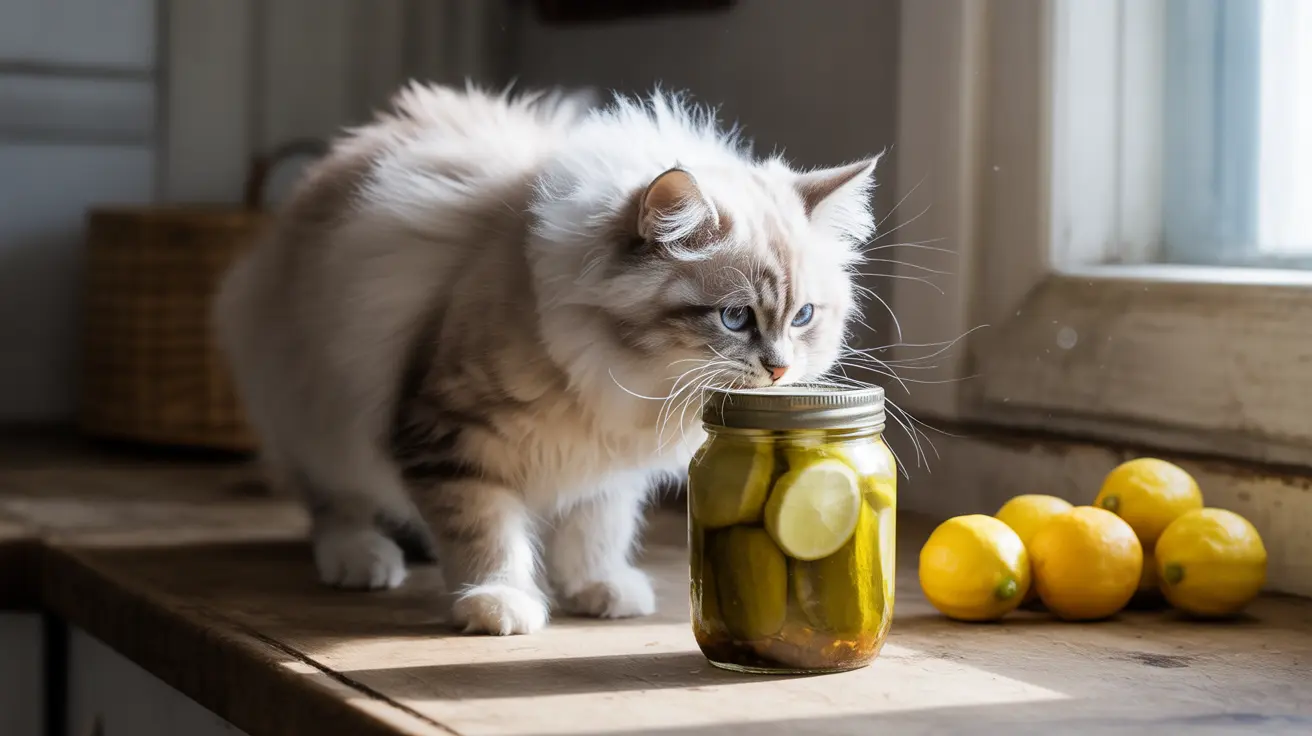Why Pickles Are Dangerous for Cats
Cats are obligate carnivores, meaning their bodies are designed to process and thrive on meat-based proteins. Pickles not only lack nutritional value for cats but also contain several components that can be harmful or even toxic to your feline companion.
High Sodium Content
The most immediate concern with pickles is their extremely high sodium content. A single pickle can contain up to 900mg of sodium, while cats only need about 16mg/kg of body weight per day. This excessive salt intake can lead to serious health issues, including:
- Severe dehydration
- Sodium ion poisoning
- Kidney strain
- High blood pressure
- Electrolyte imbalances
Harmful Additives and Seasonings
Many pickles contain additional ingredients that are toxic to cats, such as:
- Garlic and onion (common pickle seasonings)
- Spices and herbs that can irritate their digestive system
- Preservatives that cats' bodies aren't equipped to process
- Vinegar that can upset their stomach
Signs Your Cat Has Eaten Pickles
If your cat manages to consume pickles, watch for these warning signs:
- Excessive thirst and urination
- Vomiting or diarrhea
- Lethargy or weakness
- Loss of appetite
- Tremors or seizures (in severe cases)
- Pale or yellow gums (if garlic/onion toxicity occurs)
What to Do If Your Cat Eats Pickles
If you catch your cat eating pickles or suspect they've consumed some, take these steps:
- Remove any remaining pickles from their reach
- Monitor their behavior closely
- Ensure fresh water is readily available
- Contact your veterinarian if you notice any concerning symptoms
- Keep track of approximately how much they consumed
Safe Alternatives to Pickles
If you want to offer your cat a healthy treat, consider these vet-approved options:
- Small pieces of plain, cooked chicken
- Commercial cat treats designed for feline nutrition
- Tiny bits of plain, fresh cucumber (occasionally)
- Small amounts of cooked fish without seasonings
Prevention Is Key
The best way to protect your cat from pickle-related health issues is through prevention:
- Store pickles and other harmful foods in secure containers
- Never intentionally feed pickles to your cat
- Educate family members about foods that are unsafe for cats
- Keep kitchen counters and dining areas clear of pickle-containing foods
Frequently Asked Questions
Can cats safely eat pickles or dill pickles?
No, cats cannot safely eat any type of pickles, including dill pickles. The high sodium content, vinegar, and potential toxic seasonings make them dangerous for feline consumption.
What health risks do pickles pose to cats if ingested?
Pickles can cause sodium poisoning, dehydration, digestive upset, and potential toxicity from ingredients like garlic and onions. Long-term exposure to high sodium can also lead to kidney problems.
What symptoms should I watch for if my cat eats pickles accidentally?
Monitor for excessive thirst, frequent urination, vomiting, diarrhea, lethargy, loss of appetite, and in severe cases, tremors or seizures. Contact your vet if you notice any of these symptoms.
Are homemade pickles any safer for cats compared to store-bought ones?
No, homemade pickles are equally unsafe for cats. They still contain high levels of salt and vinegar, which can harm your cat regardless of the source.
What are safe vegetable treats I can give my cat instead of pickles?
Small amounts of plain, fresh cucumber (without seeds or peel) can be offered occasionally. However, remember that cats are carnivores and don't require vegetables in their diet. Stick to commercial cat treats or small pieces of plain, cooked meat for treats.
Remember, while pickles might be a tasty snack for humans, they have no place in your cat's diet. Focus on providing your feline friend with nutritionally appropriate foods and treats designed specifically for cats to ensure their health and happiness.






